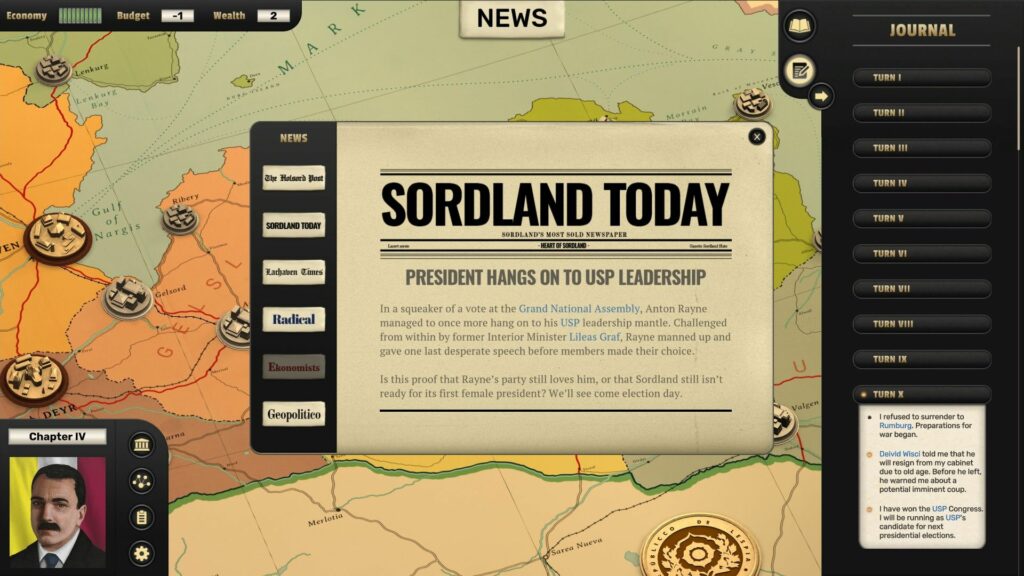On the one hand, there’s a lot to like here. On the other hand, there’s also a lot of things that don’t quite work.
I have a bit of a soft spot for democracy simulators – probably because of my latent desire to become President of the United States (even if recent political developments have made me far more cynical about things). Still, I can’t turn down the opportunity to play a game that lets me live out a bit of that fantasy.
I’ve played through Suzerain twice: first normally and then to fix what I thought I did wrong the first time. During the first playthough, there were many choices to make and people to please – it was enjoyable reading the in-game newspaper stories and keeping track of changes to the country. I think I did a pretty good job – higher employment, better economy, strong allies – which is why the sudden coup d’etat at the end threw me for a bit of a loop. Perhaps I missed the signs, but if they were there they were quite subtle with little opportunity to address them.
Unfortunately, the second time through ended even less well: I was dragged into a war which I instantaneously lost. It was also this second time through that unfortunately revealed the failings of this political simulator. First, since you only have one save slot you must play through the entire game again just to make small changes that could get you a different ending; in my case, the progression from “start of war” to “entire country overrun” was a single click of the mouse. Since I was never given the option to review the situation (I had initially planned to see how the war went before asking for assistance from allies), the entire country was overrun in a single dialogue box. Later I learned that changing that one decision would have gotten me a “good” ending.
The reason I make this complaint is both because it comes at the end of the game (so I would need to spend another 5 hours playing to change a single decision even though I was perfectly happy with everything else), and because it showed the disconnect between the unnaturally forced ending and the normal disposition of your advisors. Even during the lead up to the final decision, my generals assured me of our military’s relative strength – until the final decision came and suddenly my secretary of defense was saying how we couldn’t possibly win the war alone: the exact opposite of what he had said a scant few paragraphs before.
Both my endings were like that – abrupt and with little warning, scant days before I would have gotten a good ending. It was jarring, to say the least. While I was a fan of the game Long Live the Queen, that game is up front with its sudden ends: it’s a challenge to navigate the many and various hilarious pitfalls. Here, I was hoping for a subtler treatment – had I lost my re-election bid or the challenge to my leadership of the party I could almost have accepted it, as those possibilities were telegraphed throughout the game. Even a coup earlier in the game could have been understandable given the situation, but the game is set to end at a very specific point and no earlier (which also makes some decisions less impactful since you know they won’t end the game).
I found similar issues at various stages of the game. Often, my advisors would talk past each other (occasionally leading to non-sequiturs), likely due to the need to accommodate vastly different play styles. I was willing to forgive it that, but the second playthrough also revealed that some events seemed to be set in stone: among them, widespread protests against your leadership even when the economy recovers from the recession, education/healthcare is at an all-time high, and polling shows high support. Your son is even reported to join these protests even if you have a good relationship with him and his girlfriend openly supports your administration. My first time through, I was entirely confused when this happened and utterly befuddled when the protest leader asked for my resignation for “obvious” lack of reform – even though our goals were essentially aligned, I had just passed a more democratic Constitution by pulling together an alliance, and the protester leader’s “demands” were to support a reform bill that I would have been happy about anyway.
The game also has a pretty singularly 2020 U.S. outlook on politics – there were far too many times I found myself thinking that if someone played this game even 50 years ago or even just another country, they would find some situations and responses strangely contrived – or at the very least, that they seem to be making a lot of not-so-sly references to something. There are also numerous off-hand references to Earth culture, from most characters having names a few letters away from historical figures to one of the best/worst puns I’ve seen – you are President Rayne and you’re making a speech in Anrica, so the religious leader says “Bless the Raynes down in Anrica.” Though I appreciate the effort with the names, symbolism, and such, it does occasionally break immersion – especially since the sort of people that would enjoy this game would also recognize the references.
Even so, it was a fairly enjoyable afternoon – which makes categorizing the game difficult. The conversations with advisors and rival politicians were enjoyable (even if they occasionally had some poor grammar) and it felt like a solid start to running a country. But only a start. I don’t typically like to criticize games for not having enough game, but here I think I must since the forced endings just left a sour taste in my mouth. Tier Two, but a high Tier Two. Perhaps I’ll go back someday as a military dictator and see what happens.
